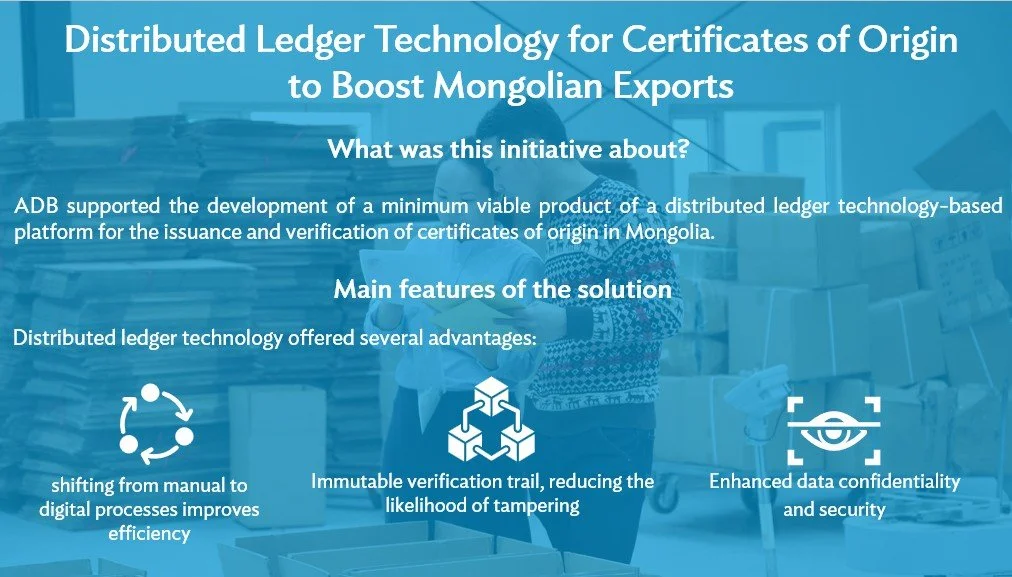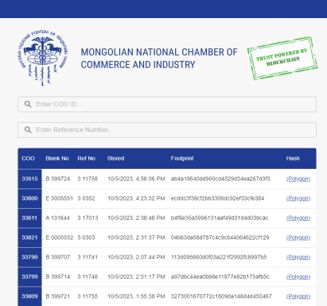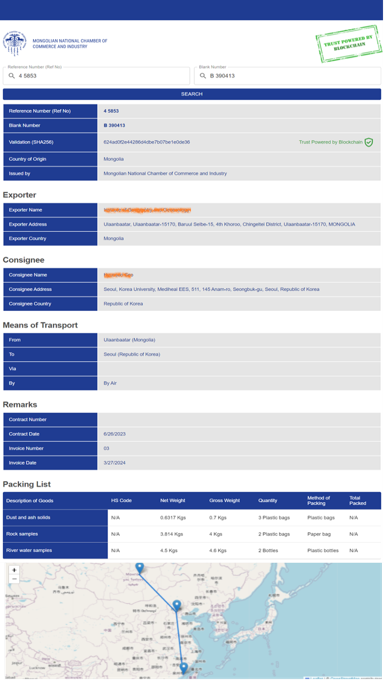Distributed Ledger Technology for Certificates of Origin to Boost Mongolian Exports: Promoting Security and Efficiency in Trade Using Emerging Technology
Country: Mongolia
Implementation: April 2023–March 2024
Technology: Distributed ledger technology
ITD Partner ADB Department: Economic Research and Development Impact Department
Beneficiaries:
· Mongolia National Chamber of Commerce & Industry
· Customs General Administration Mongolia and Ministry of Foreign Affairs
Technology: Distributed Ledger Technology and blockchain, encryption, smart contracts
ITD’s Partner ADB Department: East Asia Department
ADB Partner: Morpheus Network—technology service provider
In line with Strategic Development Goal 17: Partnerships for the Goals
International trade plays a critical economic role in Mongolia where exports of goods and services make up 69.1% of the GDP as of 2024. In recent years the economy has shown strong recovery, achieving 7% GDP growth in 2023 following the pandemic-induced contraction of -4.6% in 2020.
Efficient trade facilitation has become strategically important to the growth of Mongolia’s economy. The country has outlined Vision 2050, which reflects Mongolia’s aim to become a "Digital Nation" wherein technology and digital innovations are integrated into all sectors of the economy and society to boost efficiency and production. Thus, the Government of Mongolia has enacted comprehensive legislation to push government digital initiatives to support this vision.
Certificates of Origins (COOs) are used to confirm a product’s country of origin and serve as the basis for determining what trade rules and tariffs to apply for that specific product. The Mongolia National Chamber of Commerce and Industry (MNCCI) is the authorized entity to issue COOs. MNCCI issues COOs for the Generalized System of Preferences of 37 countries, 6 countries under the Asia-Pacific Trade Agreement (APTA), and the Mongolia-Japan Economic Partnership Agreement (EPA). The Mongolian Customs General Administration (MCGA) is responsible for trade compliance and requires that printed COOs are checked against their originals.
Mongolia’s full trade potential is constrained by border delays, poor infrastructure, and weak regulatory environment that drive up its trade costs. Various issues affect the ease of verifying the authenticity and accuracy of COOs. The COOs are produced and printed from the MNCCI’s database. In cases of inconsistencies or potential fraud, importers, exporters and border control agencies need to contact MNCCI to confirm a COO’s authenticity, entailing additional costs and delays that defeat the benefits of preferential treatment. This is especially burdensome for the exporters, particularly those who enjoyed low or zero tariffs because of preferential schemes and trade agreements, including free trade agreements.
Trade facilitation and improved utilization of tariff preferences from the Generalized System of Preferences and free trade agreements will help reduce costs to traders, expand exports, and contribute to economic diversification.
Therefore, there was a need to modernize the system not only to make the issuance and verification of COOs more efficient but also reduce transaction costs and promote trust and cooperation among trading stakeholders. Doing so would also support the establishment of a National Single Window facility to further simplify and streamline international trade (A single window is an electronic facility where parties who are involved in trade and transport can submit standardized information and documents on a single entry point to comply with import, export, and regulatory requirements). Incidentally, this initiative is also being supported by ADB through the Regional Improvement of Border Services Project.
The Mongolian Ministry of Foreign Affairs sought ADB’s assistance in developing an online portal for verifying COOs. This request came after Singapore International Chamber of Commerce and Cargo Cloud Pte. Ltd. used distributed ledger technology (DLT) for electronic certificates of origin in 2018. ADB, through its Digital Learning Labs, subsequently launched in 2022 a call for submissions for DLT-based solutions. The firm Morpheus Network was selected to implement the initiative.
This initiative aimed to develop a Minimum Viable Product (MVP) to show whether DLT could be used to increase efficiency, reduce risk and costs, and streamline the issuance and verification process of COOs. In addition, the MVP should prioritize data security and confidentiality. The intent was to have a platform promoting and maintaining trust and cooperation among trade parties, including chambers of commerce, traders, customs, and other third parties. The result was a self-service portal enabling users to digitally check COOs, where each COO was digitally signed and each resulting digital signature was stored on DLT. The ledger is tamper-resistant against any unauthorized modification.
The firm Morpheus Network was engaged by ADB from April 2023 to March 2024 designing and developing the solution based on the requirements of the working group composed of ADB, MNCCI, and MCGA:
· April–June 2023: Project and technical needs assessment, which included a review of the existing procedures, legal guidelines, data and data workflow in the issuance of COOs. Gaps and recommendations were also identified. The Ethereum-compatible public DLT platform Polygon was subsequently chosen given its technical maturity and cost.
· July–November 2023: The DLT-based platform for COOs was developed and delivered with its front-end back-end features to monitor and verify online the generated digital footprints of COOs.
· December 2023–March 2024: A set of technical add-ons were identified with the stakeholders and with the main objectives to further consolidate data security and confidentiality, data traceability, monitoring tools (including a blockchain "gas" meter) and improvements of the user interface.
The digital initiative was developed successfully with a strong cooperation with the ABD Digital Learning Labs and a high level of motivation and participation from MNCCI.
Sample screen
Over 500 COOs with their digital footprints were processed in real-time with neither technical limitations nor errors. Cost analysis demonstrated significant efficiency gains: blockchain transaction costs on Polygon ranged from $0.005 to $0.06 USD per COO, the choice of DLT, Polygon, and the solution is economically viable for Mongolia's annual COO volume.
The platform was designed to be compatible with the existing system used by MNCCI, while also having the potential to be linked with the enhanced Customs Automated Information System (CAIS) of Mongolia.
Sample screen
MNCCI expressed its strong interest in expanding its use of DLT and transform the MVP into an operational product. There are now discussions to expand the initiative at a national level for MCGA to expand its capacity to process multiple types of certificates (including COOs). Additionally, the portable nature of the MVP demonstrates potential for knowledge sharing across Central Asia Regional Economic Cooperation countries, supporting broader regional digital trade facilitation initiatives.
There is also initial interest in exploring using digital technologies to streamline the issuance not only of COOs, but also other certificates in other Developing Member Countries and sectors. These include food safety certificates and health certificates.



